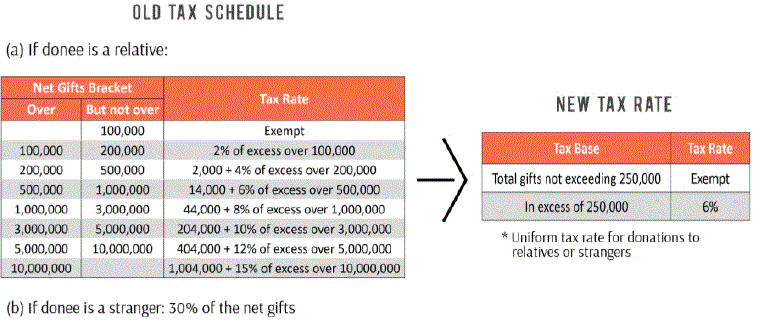Are you familiar with the donor’s tax train law in the Philippines? If not, then you need to read on and find out what it is all about. This new tax law has been causing quite a stir among business owners and employees alike, so it is important to understand how it works and what its implications are. Keep reading to learn more!
Donor tax is the tax on the transfer of gifts without consideration. These gifts might come from your parents, friends, loved ones, or from your employer. But how does the government make sure that these transactions are taxed? To regulate some malpractices and other forms of tax evasions in the Philippines, the government imposed a tax called “Donor’s tax”. Let’s start to discuss what’s new on our “donor’s tax train law”.
What is the Donor’s Tax Train Law?
When a person transfers property to anyone without consideration during his lifetime, the act of transfer is subject to a tax called the donor’s tax. Donor’s tax is not a tax on properties, but on the action of transmission or by way of a gift. For more updates visit the BIR homepage!
Have you given any gifts or donations to someone? Have you experienced difficulties in filing the donor’s tax in the Philippines before? Interestingly, the new rulings in the Philippines made it simpler and more comfortable to compute. Do you know why? Before you give gifts or transfer properties, you should know these facts about the new donor’s tax in the Philippines under this train tax law.
What are the Requisites of Valid Donations?
This shall not take effect if the donation is not completed. The transfer of property is completed/perfected if the following elements are met:
- Acceptance of the donee or recipient
- There is actual or constructive delivery of properties
If the property donated is immovable, it must be in public document specifying therein the property given. Deed of Donation or in a separate public record could be enough, but it shall not take effect after the completion during the lifetime of the donor.
What is the Donor’s Tax Rate?
Under the old regulation of the donor’s tax, the transfer of properties is taxed based on the donor. Under the TRAIN law, it makes the computation simpler and easier to understand and to remember. All transfer of properties during the lifetime of the donor will be subject to six percent (6%) more than two hundred fifty pesos (250,000) during the calendar year.
The new tax rate is 6% for any donations which is more than 250,000 regardless the relationship of the giver and the recipient.
However, any contributions/gifts in cash or kind to any political party or coalition of parties, candidate for campaign purposes shall be governed by the Election Code, as amended.
What are the Exempted Donations
In general, all donations in the amount of 250, 000 or less within the calendar year will not subject to donor’s tax.
There are some gifts or transfers of properties that are exempted by nature or by law. Here are some of those donations:
Transfer for less Than Adequate Consideration
Any property transferred other than real estates for a less than an adequate amount and full consideration in money by which the fair market value of the said property exceeded the value received; then any excess will be considered as part of the total gifts to be subjected to donor’s tax.
However, any property transfer made in the ordinary course of business or arm’s length transaction and there is no donative intent will be considered as sale and be exempted from transfer tax but rather a business tax.
Transfer for Public Use (TPU)
Gifts made to the government for public purposes and to any entity created any of its agencies which non-profit organization is not subject to tax.
Gifts made to educational, charitable, religious, cultural or social welfare corporation, trust or philanthropic organization or research institutions be exempted provided that more than thirty percent (30%) said donations should be for administrative purposes.
Donations Made to Your Spouse
Donations or gifts given between marriage are is not subject to donor’s tax. Therefore, any transactions between spouses are considered marital properties. So it means that you can’t transfer properties without ownership.
Do you want to earn dollars up to $10 per day without website? Click here to learn!
How to Claim Exemptions?
If the donor is engaged in business donated at least fifty thousand (50,000) and wanted to be exempted from donor’s tax and to claim a full deduction of the gifts given, a notice of donation by a donor should be given to the Revenue District Office (RDO) within 30 days after the receipt of the donee’s duly issued Certificate of Donation.
This certificate should be attached to the Notice of Donation and should state that not more than thirty percent (30%) of the donations will be used for administrative purposes.
What are the Valuations of Donations?
General rule: Every property of the decedent is appraised according to their fair market value at the time of his death.
Real Property
Any real property is to be valued at the fair market value as determined by the Commissioner or the fair market value (appraise value) by an assessor whichever is higher.
Shares of Stocks
The market value of the stocks will depend on whether listed or non-listed in the stock exchanges. If the shares are listed, the fair market value is equal to the mean between the highest and lowest cost at the date of death, unless otherwise market value at the time of his death.
Those stocks that are unlisted are based on their book value while preferred stocks are valued at par value. In computing the book value of the ordinary shares, the surplus shall not be included the same as to proffered stocks, if there is.
Annuity, Habitation, or Right to Usufruct
In determining the values, the probable life of the beneficiary with the latest basic standard mortality table must be considered.
For computing the NET GIFT, if there is a mortgaged property transferred as a gift and transfer also the obligation to pay, then the mortgage payable should be deducted to compute the net gifts.
If the donation is complete because of reserved powers. This transfer can be done if the donor renounces the power or his right to exercise the reserved power stops because of the fulfillment of some conditions other than death.
Related: De minimis Benefits and a 90,000 Tax Exemption Philippines
Conclusions
What can we learn about the donor’s tax train law in the Philippines? Not all donations are subject to a 6% donor’s tax under train tax law. Only those donations that are more than thresholds of 250,000. If you have anything to give comments on this article, please feel free to drop your thoughts below. Let us know your thoughts because we value every thought.
Recommended: Five Effective Ways in Solving Estate Tax














aaron clavio
Hi,
Just want to ask about transferring of property from a parent to their children using Deed of Donation.
Aside from donor’s tax of 6% and Docs Stamps of 1.5%, will it be subject to VAT if the property is commercial (as indicated in the Tax Declaration?
If it only involves 6% donor’s tax, will this mode of transfer be used by others just to escape the capital gains tax + vat?
Kindly enlighten. Thank you very much